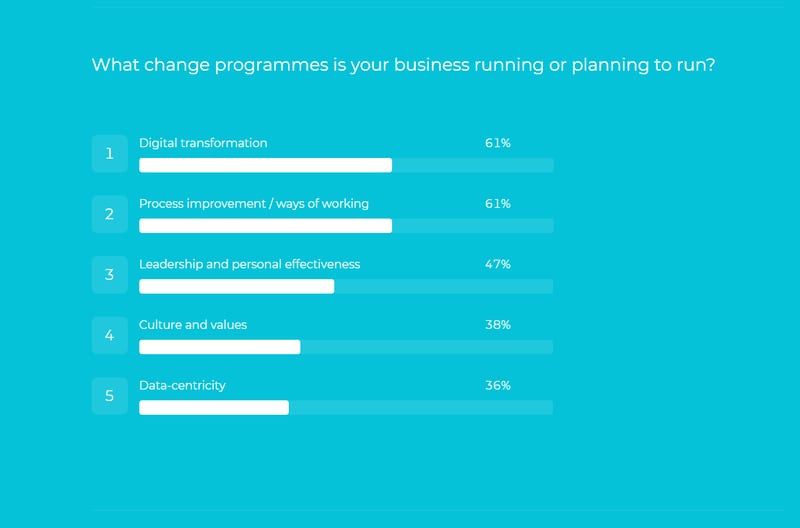TL;DR - every organisation needs to embrace change to stay profitable, thus every one is running some kind of change programme. But there’s not enough data out there on what kind. We think there should be, so we need your help answering a couple of questions (survey here).
Change or die. Adapt to survive. It’s the inevitability facing almost every organisation as the fourth industrial revolution continues to redefine how we think about work. Half the companies on the FTSE100 in 1990 were no longer there in 2015. No one wants to be the next big (or small) name to fall, and the only way to safeguard against it is to adapt intelligently.
But how do we effect change at an organisational level? It starts with people. Gone are the days of top-down managerial commandments being chiselled into an all-company memo that everyone promptly deletes. These days, there is a whole raft of methods, channels and tech used to engage and enable teams to transform their capabilities and processes. HR, OD, L&D, People, Talent - we’re all working towards the same goals. Or we should be. The appetite is there from our people - and it’s ravenous.
We now have a motivated workforce that rates development opportunities as the most important motivation for joining a company - and the #1 reason for leaving it. It makes sense. Technological change means that it’s imperative for people to become lifelong learners just to stay relevant, with up to 30% of UK workers potentially needing to transition between occupations or skills levels by 2030. There is a massive appetite for skills development on the ground - the key is simply to harness and direct it.
So employers who deliver that opportunity to develop stand to benefit hugely not only from the increased capability and agility of their workforce allowing the organisation to change, but also the engagement and retention bonuses it brings.
Where’s the catch?
Well, it turns out it’s not easy to do well. In fact, we’re not doing a good enough job at all. Only 13% of employees ‘rate L&D opportunities in their organisation over the past year as very effective’. And only 21% said ‘they feel well equipped to do their job to the best possible standard.’
It’s a big problem. That’s why we have focused our attention on solving it, enabling Filtered to do what it does best for our clients - and what’s most important to businesses. We’d much prefer to do one important thing well than try to do everything and fall short. Catalysing change by providing people with a way to seize development opportunities they actually enjoy and find useful. Over 80% of our users find their personalised recommendations useful and the same proportion goes on to apply that in their daily work, delivering change right off the bat for many thousands.
But we’re aware that Filtered isn’t the only way to help deliver change. We see the best results for the businesses we care about as part of a concerted, coordinated change campaign the whole organisation is unified behind. We constantly strive to improve the ease with which Filtered integrates with adjacent technologies and change campaign plans.
However, despite the fact that pretty much every organisation (85%) is undergoing change programmes in one form or another, there is very little data out there on how to support them through development of the right skills and capabilities.
That’s why we want to ask you a few questions to get an idea of what the change landscape is like today. They’re right underneath here and will only take a few minutes to complete. Our data science team will then use them to create a succinct anonymised report and send it out to everyone that participated so that you can get a sense of what everyone else is up to and perhaps get some ideas on where to focus next. Let’s turn and face the strange.
Here's a preview of the results so far:
